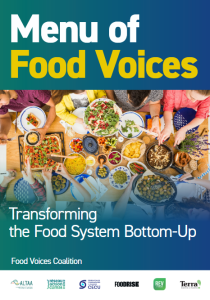Here it is: our Menu of Food Voices! This document reflects our key learnings during the eighteen-month Food Voices Coalition project, funded by Healthy Food Healthy Planet. Seven organisations in six European countries worked in various ways to influence the food retail sector, from workshops to research and campaigns, through food policy councils, networking, and mobilisation. The common thread in all our work is that we worked from the bottom up, giving a voice to citizens; to marginalised communities, students, and farmers.
A brief recap of our impact so far:
- Foodrise EU supported residents in a food desert in developing a ‘democratic supermarket’ – a retail model linking food access with community, social, and economic empowerment and has been now included in the local food strategy of the municipality of The Hague. Our approach disproves the stereotype that low-income groups only care about price, showing instead that food can be a starting point for inclusion, health, and dignity. The concept of a democratic supermarket is having momentum with research and an animated video
- Foodrise UK explored alternative food networks in deprived areas of Liverpool/Knowsley, focusing on the Queen of Greens mobile greengrocer as an example. Research interviews revealed that residents often prefer community-led shops and pantries over supermarkets, challenging assumptions about consumer choice and showing the limits of food aid.
- Green REV Institute positioned food as a human rights and solidarity issue, engaging youth, local decision makers and citizens through Safe Food Days, participatory storytelling, Safe Food Magazine and Safe Food Portal. Their innovation lies in giving young people leadership roles, proving that ownership, relatability, and emotional connection drive engagement more than technical advocacy. They engage youth in advocacy work by writing to national policy makers and undertake bold action such as filing a complaint to the European Ombudsman regarding the European Commission’s unfulfilled commitments on sustainable food systems.
- ALTAA developed the tool “My Responsible Supermarket” to map 16 areas of retail activity which can be influenced and shaped at the local level. It includes 50 action levers of change that can be implemented by supermarkets and 40 action levers for other stakeholders. Their approach is unique in showing that supermarkets’ practices can be shifted locally and calls on dialogue and cooperation between store managers and local food practitioners creating proof of concept for stronger national and EU regulation.
- CECU has collaborated with residents in the region close to As Conchas (Galicia) to reframe conflicts related to pollution as a struggle between community and the corporate food system. By defending fundamental rights, they achieved a historic court ruling recognising water pollution as a violation of human rights. They have also promoted a regional alliance in Galicia to demand a fair and healthy food system. Agricultural, environmental and social economy organisations joined forces to form ACUGA (Association of Consumers and Users of Galicia).
- Terra! focused its work on communities in Rome affected by food insecurity and the fact that this is not simply about lacking access to sufficient food in terms of quantity and quality but rather a complex and multidimensional phenomenon. Beyond the material aspect of need, it also includes intangible factors that deeply affect social relationships, sense of belonging, and psychological well-being. Terra! worked with communities to link transition efforts to ecological and social justice, demonstrating the potential of grassroots campaigns in urban settings, and contributed greatly in setting up the Food Policy Council.
What’s special about this journey is that, while pursuing and achieving impact, we did so reflectively, making the quality of the process part of the impact. By raising awareness on processes, not only among communities and stakeholders, but also within ourselves and within our own organisations, we created a lasting impact that extends beyond the project itself, because it’s about strengthening the power of change.
Although the project has come to an end, we will stay connected and continue our work!
Interested in a specific project or location? Please reach out to the organisation in charge.
For general questions please contact: info@foodrise.eu
